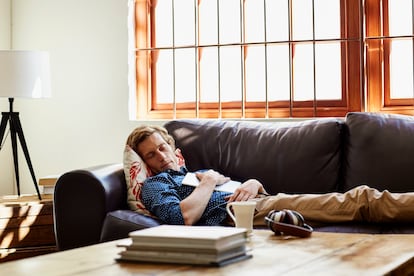Why do sleep attacks occur during the day?
If a person feels sleepy during the day even after getting enough sleep at night, it may be due to a disease

When an adult person needs to take a nap during the day, it is usually because they’re not getting enough sleep at night, and if they are getting enough shuteye time, it is not sufficiently restful. That is the most frequent cause of sleep attacks, which consist of feeling a strong urge to sleep, often followed by a period of sleep. People with sleep attacks often can’t control when they fall asleep. Other causes are less common, such as some neurological diseases like narcolepsy. This is a chronic neurological disorder that causes overwhelming daytime drowsiness and sleep attacks.
If a person feels overwhelmingly sleepy during the day even after getting enough sleep at night, it may be due to a disease. In this case an evaluation is necessary to determine whether the sleep attacks are due to a central hypersomnia such as narcolepsy, idiopathic hypersomnia or recurrent hypersomnia. Narcolepsy is a disorder that causes daytime sleepiness. People with this condition have difficulty staying awake for long periods of time and fall asleep suddenly under any circumstances. Idiopathic hypersomnia also causes severe daytime sleepiness and the person has great difficulty waking up. The term idiopathic applied to a disease means that we do not know what causes it. And recurrent hypersomnia causes patients to have recurrent episodes of daytime sleepiness, regardless of whether they got enough sleep during the night.
In a first approximation, when a person comes to the consultation because he or she has sleep attacks during the day, it is necessary to rule out that the night sleep is of poor quality or of short duration. The solution in this case is obviously to get a good night’s sleep. But let’s imagine that, due to our lifestyle, we go to bed late and get up early. In that case, if we can take a nap, we should take it because it will allow us to charge the battery. If we have the opportunity to take a nap after eating, a short nap of less than 30 minutes can solve the problem.
When a person sees a physician because he or she has sleep attacks during the day, the doctor must first rule out that the attacks are due to the poor quality nighttime sleep. The solution in this case is, obviously, to get a good night’s sleep. But let’s imagine that, due to your lifestyle, you go to bed late and get up early. In that case, if you have the opportunity to take a nap during the day, you should do so because it will help you feel more energized. If you have the chance to take a nap after eating, a short nap of less than 30 minutes will do the trick.
There is one aspect of daytime sleep attacks that is very important to consider, and that is when it happens while driving in the car. In this case, it is important to know that there is no point in singing, rolling down the window or turning up the air conditioning. The only thing that will help is to stop and sleep. If we are at the wheel and we feel drowsy, we should stop at a service station, sleep for fifteen or twenty minutes, refresh our face and make sure we feel alert before continuing the drive. Everything else is useless.
With regard to insomnia, it’s important to note that it is more frequent in women. Recent studies point to the fact that more and more people suffer from insomnia, particularly young adults. This data has surprised sleep experts a lot. One reason behind it could be that we tend to subtract time from our sleep to devote it to do other things.
A very curious fact is that people who have insomnia tend to underestimate their sleep; they may sleep for an hour and think they have not slept at all. With daytime drowsiness it is the other way around: we see it when a couple comes to a consultation and one of them is asked if he or she sleeps during the day and says “no,” then the couple answers “what do you mean, no? As soon as you sit down in an armchair you fall asleep.”
With any sleep problem, if it lasts more than a month, you should see a sleep specialist.
Milagros Merino Andreu is coordinator of the Neurological Sleep Disorders Unit at the La Paz University Hospital in Madrid. This article is part of an initiative sponsored by the Dr. Antoni Esteve Foundation and the L’Oréal-Unesco ‘For Women in Science’ program to answer readers’ questions about science and technology. This question was sent in by Mariona Trullàs Sabí.
Sign up for our weekly newsletter to get more English-language news coverage from EL PAÍS USA Edition
Tu suscripción se está usando en otro dispositivo
¿Quieres añadir otro usuario a tu suscripción?
Si continúas leyendo en este dispositivo, no se podrá leer en el otro.
FlechaTu suscripción se está usando en otro dispositivo y solo puedes acceder a EL PAÍS desde un dispositivo a la vez.
Si quieres compartir tu cuenta, cambia tu suscripción a la modalidad Premium, así podrás añadir otro usuario. Cada uno accederá con su propia cuenta de email, lo que os permitirá personalizar vuestra experiencia en EL PAÍS.
¿Tienes una suscripción de empresa? Accede aquí para contratar más cuentas.
En el caso de no saber quién está usando tu cuenta, te recomendamos cambiar tu contraseña aquí.
Si decides continuar compartiendo tu cuenta, este mensaje se mostrará en tu dispositivo y en el de la otra persona que está usando tu cuenta de forma indefinida, afectando a tu experiencia de lectura. Puedes consultar aquí los términos y condiciones de la suscripción digital.








































